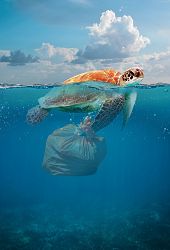

The United Nations Environment Assembly (UNEA) has approved a resolution to create the world’s first ever global plastic pollution treaty. This will be the most significant green deal since the Paris climate agreement in 2015.
175 countries have agreed to begin work to establish legally binding rules on plastic waste, in order to end the plastic pollution crisis, by tackling the entire plastic supply chain. It is hoped that these rules will be finalised and implemented by the end of 2024.
Member states of the UNEA held talks for over a week in Nairobi to agree on an international pact to address the world's soaring plastic pollution problem which is threatening the health of ecosystems around the world.
In the last few decades plastic production has risen exponentially and now amounts to a staggering 400 million tons per year. At this rate of increase, without intervention, this figure is set to double by 2040.
Executive Director of the UN Environment Programme (UNEP), Inger Andersen, commented: "This is a historic moment. I congratulate everyone involved for bringing us to this point. But a lot of work lies ahead to deal with the sheer scale of plastic pollution."
"Plastic pollution is everywhere, from the deepest ocean trench to the highest mountain peak. We see this pollution. We feel its climate impacts. We live with the sheer waste of taking a versatile, durable material and making it disposable – losing all value instead of retaining it. Now we must make the wrong-headed way we manufacture and use plastic the past."
The news has also been welcomed by conservation groups.
Graham Forbes, global plastic project lead at Greenpeace USA, said: "Today, global leaders sitting in Nairobi heard the millions of voices around the world who are demanding an end to the plastic pollution crisis. This is a clear acknowledgment that the entire lifecycle of plastic, from fossil fuel extraction to disposal, creates pollution that is harmful to people and the planet."
"This is a big step that will keep the pressure on big oil and big brands to reduce their plastic footprint and switch their business models to refill and reuse. Until a strong global treaty is signed, sealed, and delivered, Greenpeace and its allies will keep pushing for a world free of plastic pollution, with clean air and a stable climate."
Director general of WWF International, Marco Lambertini, said this was a promising first step but warned that implementing any treaty will take determination. He added: "We stand at a crossroad in history when ambitious decisions taken today can prevent plastic pollution from contributing to our planet’s ecosystem collapse. By agreeing to develop a legally binding global treaty on plastic pollution, our world leaders are paving the way for a cleaner and safer future for people and the planet."
"But our work is far from over – world leaders must now show even more resolve in developing and implementing a treaty which addresses our current plastic pollution crisis and enables an effective transition to a circular economy for plastic."